#suffer doubt
Text
"To be in doubt is a more normal condition than certainty. To confess that you doubt, to admit that you never know for certain, is the supremely human condition; for to be able to suffer the doubt, to carry the doubt, means that one is able to carry the other side."
— C.G. Jung
84 notes
·
View notes
Text
picking up astarion as a companion is like rescuing a stray cat that could never have survived on its own. like every time i have to say to myself oh thank god someone was here
#astarion#i worry abt him i do but at least he has my long-suffering tavs#honestly he held it together pretty well for the absolutely insane day he was having i do have to give him that no doubt abt it
1K notes
·
View notes
Text

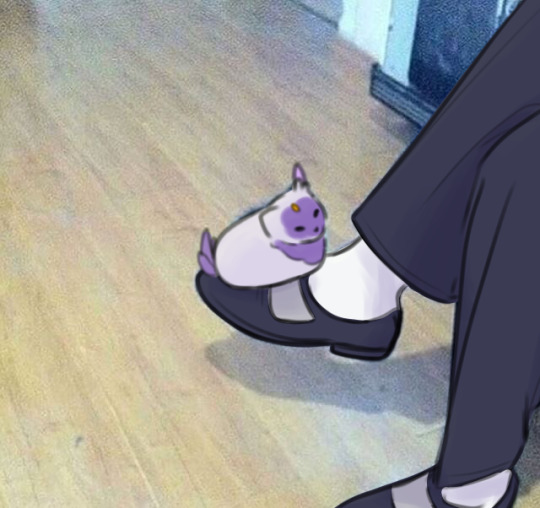

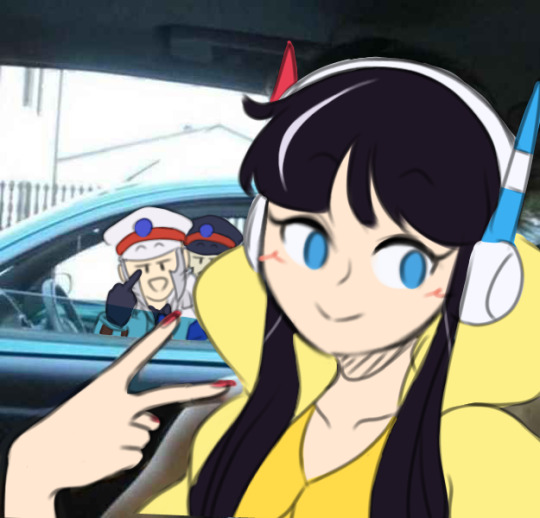
It's been a hot minute since I've done one of these but 💃 (last part)
#when in doubt (<- suffering from artblock) make memes#submas#subway boss ingo#subway boss emmet#gym leader elesa#sorry for drawing so many sneasels I'm obsessed with them <4#nimbasa trio#subway master nobori#subway master kudari#gym leader kamitsure#Pokémon#froggy shitposts
2K notes
·
View notes
Text

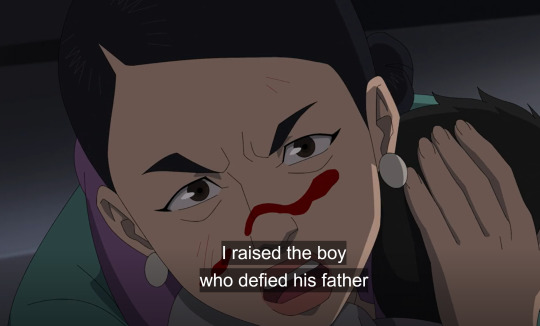
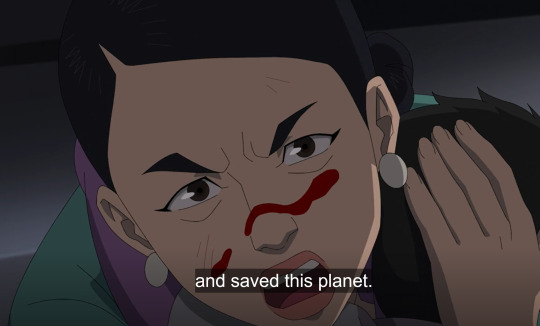

lol I did it first
#invincible spoilers#invincible#i understand production times and the script would have been written and everything recorded ages ago guys#but still makes me laugh a bit#glad they gave her more to do in the levy confrontation#not sure how I feel about 'she totes evil in all other dimensions too' but I mean#whatever I doubt we're going to get any follow up on that from her end#tho alt marks running into her and still being mamas boys w her around would be hilarious#like oh want me to kill this guy for you mom? : ) oh haha honey no lets go uh... keep them alive so they can suffer instead?#Debbie Grayson#Angstrom Levy
147 notes
·
View notes
Text
ok so
the instructions were for Wally, not the whrp/qa/You. which is especially interesting, because I think we all assumed they were instructions from Wally - after all, he's the one telling the whrp that they have work to do, he's sending envelopes (assumedly), he's sort of the driving force behind the whole in-universe project. he calls the shots, in a way. he's the one with the phone.
so who the hell is giving Wally instructions?
is it related to the distorted "extra" voice under Wally's in some of his hidden record audios? is it related to Sally's "monster"? is there someone else in Home?
just... there's a whole 'nother layer underneath Wally that i think is really scary. there's something else there, i feel. i Fear. i wonder if Wally is aware of it, or if he isn't quite as aware as we all - including him - like to think. how aware can a puppet be if they can't see their own strings (so to speak)? it's one thing to know what you are, and another entirely to understand what that entails.
#is there a puppetmaster? something or someone lurking underneath the surface?#i know there's not like... a Big Bad if i remember correctly#but im really suspicious that there is something Extra fucking with wally#like i really hope wally is acting of his own accord#but then again - what if its a mix of him acting on his own AND something else pushing him forward#is there something trying to get Out of home?#i think now of the 'im going to get it out' sentence from the about us page#i feel like wally is trying to stay In. i feel like he just wants to revive the show but he wants to Stay#so what the hell is trying get Out. to Leave#that sentence could just be talking about the show / memories of it#but now. im just. im thinking#homebogging#and i cant remember exactly but something about wally closing the guestbook bc it wasnt 'fun' anymore for some reason#i doubt the extra secret Something is home themself#because home seems to be Suffering to an extent from wally's attempts to connect with the 'outside' world#SO WHAT IS IT? HUH#i swear to fuck its connected to sally's so-called monster. the distortion. the spiral/eye pit. something looking through wally#which - no too many thoughts about that to say in tags#AND WHY IS WALLY DOING WHAT WHATEVER IT IS SAYS#is it automatic? like a 'oh. instructions. ill follow them' or does he Know who's talking to him or or or#i feel like an entire layer of the story was just revealed to us in one small simple marvelous update#who the hell is telling wally darling what to do...
135 notes
·
View notes
Text
When Optimus in Chaos Theory said "Hatred may sustain you, but it diminishes me. I am lessened by it." that was so fucking deep of him
#squiggposting#idw op love#unironically no memes btw#just... not only well written dialogue. not only well written optimus#but words that speak to me as a person#'i am lessened by it'...so true#he doesnt deny that he feels hatred (he says before that that he doesnt know)#but instead frames it as. even if he feels hatred he doesnt like feeling it#he may feel hatred but he doesnt want to hold onto it. he doesnt like the person it turns him into#once again idw optimus is out there being so intensely relatable and profound#he's so incredibly mortal and flawed#he's of great virtue but at the cost of great doubt and suffering#he is not perfect and unfeeling but rather he feels hatred and tries to overcome it
83 notes
·
View notes
Photo
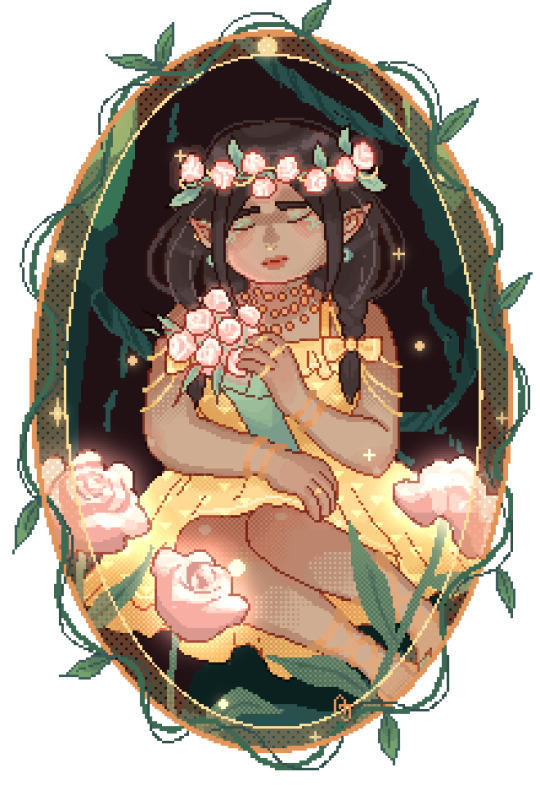
everything she deserves 🌼
#critical role#critical role fanart#mighty nein#nott the brave#veth brenatto#thinking about how her worst nightmare was to become something she hated#not just someone cowardly who survives by bullying others#but also someone hideous#'not pretty not brave not coordinated not smart...just not'#a curse at the hands of others is injustice no doubt#but how much of her suffering came from within?#a lover's respect and approval wasn't going to mean anything if she couldn't value herself#a life built on the acceptance from others makes for shaky foundations#to lose it all is a blessing in disguise#only when there's no one left by your side who loves you can you learn how to love yourself#the bravest and beautifulest of them all#end love poem.
890 notes
·
View notes
Text
listen its not that tamlin locking feyre in a manor is ‘not a big deal’. its that sjm parallels tamlin and rhysand way too much for rhysand to be a viable, healthy option for feyre.
rhys put a whole city under a lockdown so severe people forgot about its existence (and from what the wiki says, the city was kept hidden for centuries even before, for the safety of its citizens) but tamlin locking feyre in a manor, so she wouldn’t follow him into an unsafe situation was crossing a line?
#finally resuming my reread of acomaf and thinking about feyquin-done-right aus in my head to get through it#at the risk of getting ‘too deep’ about the faerie smu t books its stupid to assume everyone would be on board with being locked in#velaris for 50 years#you’re telling me no one had doubts the half-fae HL could keep them protected? (ps. this is where you bring in doubts about his#illyrian bloodline sarah)#especially when the illyrians started joining amarantha’s side (bc they were following their HL’s example)#you’re telling me mor cassian and azriel were okay with rhysand suffering amarantha alone? (this is where you could’ve shown the strong#bond/ties within the IC sarah especially if azriel and his shadow powers and his spying came into play sarah)#this is why its taking me so long to finish reading acomaf i read one chapter and can’t resist writing a long rant about it#anti acomaf#anti feysand#anti sjm
126 notes
·
View notes
Text
Manifesting at least one (1) wholesome interaction between Amalia and Adult! Yugo next week. Please, Ankama, this is what I've been waiting for, I'm begging you.
#I need a wholesome reunion where an awed Amalia at first has doubts about the hunk before her being her Yugo#only for him to do something that will IMMEDIATELY make her understand it's really him#not some clone or lie like Oropo#please#they've suffered so much because of Yugo's insecurities over his appearance#they deserve this#please give me all the Yumalia#wakfu#wakfu season 4#wakfu spoilers#wakfu season 4 spoilers#yugo the eliatrope#amalia sheran sharm#adult!yugo#yumalia#ankama
72 notes
·
View notes
Text
My unhinged thoughts on Luffy and Garp's relationship post-Marineford
Y'all have a very lovely comment on one of my fics to blame for this rant on Luffy and Garp's relationship and where they stand after Marineford:
Luffy and Garp as they relate to each other is so interesting because I think despite his absences, Luffy acquired a lot of his ideas about what family is and isn't from Garp. And, maybe, learned to separate what a person is to him from who that person is, too. In a way I think that's why he imprinted so hard on Shanks--he's the first person Luffy met whose role in his life matches who he is as a person and it's why he builds himself a family by acquiring people whose goals match his own so that there IS no conflict. Fast forward to Luffy as a teenager, we see that when Luffy is confronted by a person who has a conflict with his own ideals and goals, it doesn't present an inherent issue for him--that's the primary way he relates to people anyway (for ex: Coby).
Garp is also the one who modeled for Luffy that presence/time spent doesn't correllate to the strength of a relationship, that just because Garp wasn't there all the time doesn't mean they don't have a bond. And yes this gave Luffy all the abandonment issues but it's clear that Luffy has accepted it by the time canon comes around. At some point he clearly decided to view it as "Gramps gave me what he needed and made sure I had a family to grow up with and that's plenty, of course he loves us," and not "Gramps abandoned me and never loved me."
On top of all of that, whatever else Garp did or did not think about him, Ace, and Sabo, and their dreams, Luffy grew up knowing that Garp valued them and their lives above the letter of the law and his job. Luffy never cared who Ace's dad was, but he grew up knowing that Garp also knew and always thought he deserved to have a chance to live, and always loved Ace even if he never approved of the kids' desire to be a pirate. He knows that Garp values family over the law.
And then there's Garp. Garp who Sengoku describes as "a family man more than a marine." Garp who refused (multiple!) promotions to the Admirality because he didn't want to serve the Celestial Dragons, Garp who Roger trusted with his very own kid. His parenting techniques might be...questionable (read: If this was a real man he would have CPS called on him so fast but we're going with the intended reading of him from the manga) but it's clear he loves the kids.
We also know the man has a flexible view of the law, he's a Marine because he believes it's where he can do the most good/help the most people. He views the rules as things he can bend if not break (a quality that clearly gets stronger as the generations pass lmao). He doesn't seem to respect authority, but he DOES seem to respect the need for the perception of it, or at least the role the Marines need to play in the eyes of the public. He believes people need heroes to believe in, and he believes the Marines should fill that role, and that's what he spent his life trying to embody.
And then Marineford.
Garp is caught between these two things: his family, and the institution he devoted his life to. And it sucks, obviously. He goes to visit Ace in Impel Down and he tells him a few things, but Garp says 1) No one can stop the war (not even him), 2) he's proud of Luffy for everything he did at Enies Lobby and Sabaody, (which also tells Ace that he's not condemned in his eyes for being a pirate--the condemnation of his life is coming from the institution Garp works for, not from Garp as a judgement of the man he became).
Ace responds by saying Whitebeard is the only father he has (ouch--Garp is the only father figure Ace grew up with), which is the last exchange we have until this:
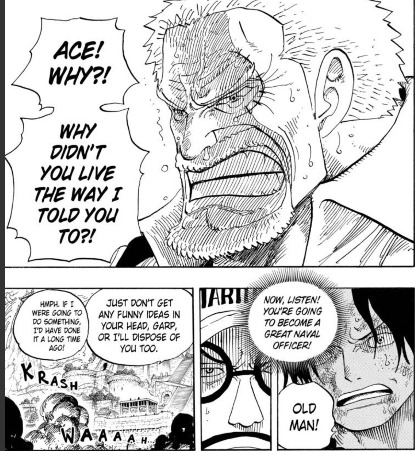
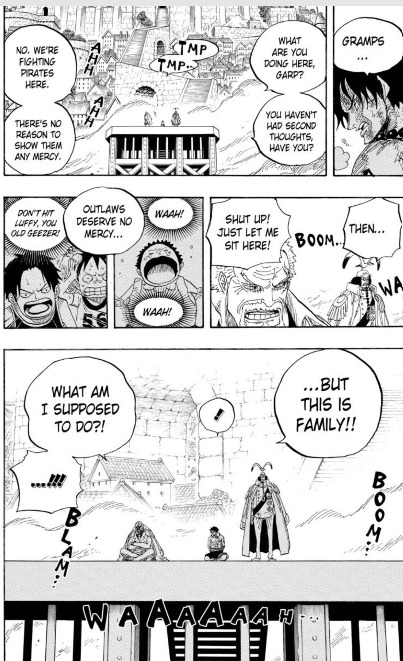
Garp believes in the need for the execution and the war in general--the problem for him is that this is his family. This is the baby he took responsibility for, a kid he's loved for years. So Garp doesn't do anything in the war, doesn't object or condem. All he does is take a seat next to Ace, keeps him company. And to be fair to Garp? It doesn't seem like Ace expects anything more. And it seems like he appreciates it.
So he's got one kid on the execution stand, and he's resolved to let him die for the sake of what he thinks is the greater good. And his other kid, the one chasing the same fate that's getting Ace killed now, is trying to save his life. And he just...watches it unfold, because he's trapped by his own convictions--another thing he passed down to both of the boys, so how can he betray what he told them and not hold steady to his own beliefs?
I think for Luffy, he probably didn't have much time to process Garp's presence at Marineford or his role in Ace's execution at the time. In fact the only time they really interract directly is this moment from a chapter literally titled "The Execution Platform":
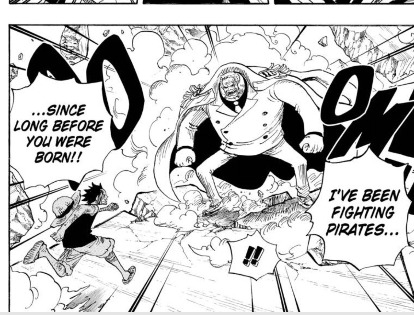
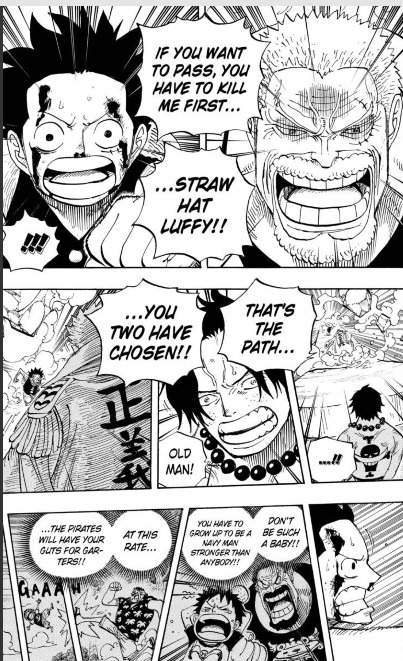
The title obviously refers to the literal execution platform Ace is on that Luffy has been trying to reach the entire arc but metaphorically? It's also about this. Luffy, being confronted with a grandfather who is for some reason putting his job over his brother's life, and Garp, making a last ditch effort to stand by his own conviction.
There's no way Luffy can understand this decision in the moment--he already made the same one on Amazon Lily, where he was faced with the option to either go and meet his crew on Sabaody (keep following his dream) or go after Ace. He chose Ace, because Luffy always chooses people over his own goals. I think he would understand Garp more if he had been present for Garp and Ace's conversations on the scaffold, but he wasn't.
There's an argument to be made here that Garp is giving Luffy the opportunity to save his brother by stepping in himself and letting Luffy punch him. It would be more plausible except for the fact that Garp calls Luffy "Straw Hat" here instead of "Luffy." He drops the familiarity, and he sets himself in Luffy's way, even when Luffy begs him. I don't think Garp knew he was going to let Luffy knock him away until the very last second. Not until Luffy committed to punching him.
He gives Luffy this one last piece of advice, this one last chance to be his grandfather, where he says "this is the path you have chosen, and it will be difficult, but you're on it now and you have to commit.":

And he remembers Ace saying he wants to live, and lets Luffy hit him to get to his brother.
This is the last we see of their relationship. Luffy doesn't mention him again except to tell Chin Jao off in Dressrosa. Presumably he processed how his relationship with his grandfather has changed in the aftermath, but what he thinks about it? Mostly a mystery. All the things he got from Garp are still true, and I think he still probably manages to compartmentalize most of it as a person vs. dreams/conviction thing. Luffy wouldn't judge Garp for his decisions, and he wouldn't hold resentments either. Whatever he feels or doesn't feel toward Garp, it's definitely overshadowed by Ace's loss.
For Garp's part, the man retired immediately after the war. Luffy literally says "If I don't do everything I can to save Ace, I wouldn't be able to live with myself" a few chapters before the execution stand, and Garp didn't live with himself, at least not without changing his circumstances. He gave up his commission to run escorts for royalty and train people. We do know he's still proud of Luffy, like he told Ace in Impel Down, and he laughs when Luffy's New World exploits are brought up. Garp's the one with regrets, not Luffy, and I think if they ever speak again (who knows, with Garp being...y'know), it'll be about those regrets.
What else do you talk about with estranged family?
#one piece#luffy#garp#meta#long post#tp#marineford spoilers#dressrosa spoilers#impel down spoilers#reverie spoilers#egghead spoilers#tbh I felt a lot more sympathetic to Garp by the end of this than I expected#I mean he's still an idiot#what kind of grandfather doesn't fight the military to save his grandkid when he has the chance#but this is one piece and in the eyes of the series#Garp is not a bad guy because he was suffering a conflict of ideals#Luffy deserves to be mad at him but I doubt we're gonna get that/doubt he IS mad#just disappointed
103 notes
·
View notes
Text
batfam fans who aren't also jason fans must be having the best time
#dick and tim batfam fans are constantly eating good#you guys get to have so much fun#and then jason fans have to suffer with constant mischaracterization#and jason being treated like a demon spawn#thought i doubt cass and duke fans are having much fun either#jason todd#red hood#batman#dc
93 notes
·
View notes
Text
🪷 The Lotus Flower in Mysterious Lotus Casebook 🪷
i. Growing Deep Roots
As noted by difeisheng, Li Xiangyi is an image more than he is a person. He’s the “symbol” and “beating heart” of the Sigu sect; “he embodies everything [the sect] stands for” and “has become one with every person he represents” in his role as a leader. As such, one might say he doesn’t exist as an individual who’s allowed the luxury of flawed, fluid humanity. Rather, he’s fixed into an object: a shield protecting those under his care, a mirror reflecting those he’s taken upon himself to be the champion for.
While a heavy burden to carry, this identity as image is also shown to be brittle, hollow, like a hazy mirage which is more dazzling appearance than substance. Even Fang Duobing introduces Li Xiangyi to Li Lianhua by showing him a painting of his shifu — ink on a page, a person turned into a hero to be worshipped and idolated.
Li Lianhua, over the ten years that pass after the Great Battle of the East Sea, works to plant and cultivate a new identity in the same way one might grow flowers. Li Lianhua forms deep roots and grows out of the mythical hero’s shell he’d been carrying as Li Xiangyi, thus developing an identity which is solid and grounding in contrast — an identity which involves “walk[ing] within a crowd instead of [soaring] above it.”
This shift from image to person is itself rooted in the lotus mantra (written by Buddhist Layman Pang during the Tang Dynasty) which Li Xiangyi first encounters after monk Wu Liao rescues him:
一念心清净
莲花处处开
The heart attains peace with a single thought;
Lotus flowers bloom all around.
Although the exact timeline is left to interpretation, it’s implied that the lotus mantra operates as a catalyst of change for Li Xiangyi and that he changes his name to Li Lianhua after reading it. Now what is it about it that speaks to Li Xiangyi so deeply in that moment? As noted in 《 人間福報 》, the lotus mantra teaches us that a pure heart will result in an open and enlightened mind. One subtle, profound thought rife with compassion is enough for a person to glimpse Buddha in a flower, a leaf, a grain of sand or a speck of dust. In short, “if you can find peace within yourself, then you will find peace everywhere.” Perhaps Li Xiangyi, at his lowest point, finds solace in the prospect of stripping his life down to its very core and searching for purity, wisdom and peace within his troubled heart.
By renaming himself 莲花/liánhuā lotus flower, Li Lianhua takes his destiny into his own hands; he empowers himself into reshaping his identity and laying down the foundations for the person he wants to become. Similarly to The Yin-Yang Master: Dream of Eternity which tells us that “names are the shortest spells in the world,” Li Lianhua’s new name functions as a spell which speaks a new him into existence. It’s a deliberate choice, a conscious attempt at breaking free from the suffocating shell Li Xiangyi was trapped in and become a person of his own choosing.
The act of (re)naming notably also extends to Li Lianhua’s abode which he dubs 莲花楼 “Lotus Tower.” In addition to this significant choice of name, it’s interesting to note that Li Lianhua starts growing vegetables inside Lotus Tower when he’s left with nothing after his demise at the East Sea and is facing starvation. As such, his home is quite literally a site not only of self-sustenance and survival, but also of growth — a growth which requires hard work, patience and faith and nearly brings Li Lianhua to tears when his hopes are finally rewarded and the seeds he planted begin sprouting. The act of physically planting vegetables and learning to cook those vegetables speaks of a refreshing and grounding simplicity — of something disarmingly vulnerable and human after playing the role of a god-like figure. Li Lianhua has sweat on his brow and hope in his heart; he plants seeds, watches them grow and keeps himself alive by his own hands.
It seems it’s not only Li Lianhus’a home, but also his very person, which steadily grow into a lotus flower. Li Lianhua wears a variety of hairpins directly linked to the lotus, and the colour coding of his garments moves from the red he used to wear as Li Xiangyi to a lighter palette filled with greens and blues — colours which are more obviously linked to nature.
ii. Life Borrowed and Given Away
The lotus, both traditionally and within the drama itself, is closely connected to the theme of rebirth. On a literal level, the exotic lotus flowers of Cai Lian Manor grow directly from the corpses of the victims drowned in the pond, thus embodying life born from death. thawrecka writes in their story that Li Lianhua is “nothing but a lotus nurtured by a walking corpse, a body that doesn’t realise it should already be dead.” On a figurative level, the lotus grows in muddy water but blooms unsullied every morning, thus symbolising rising from a dark place and growing into something beautiful and colourful despite all the odds. The different stages of the lotus’ blooming can be taken to represent the beginning, middle and end of a spiritual path in Buddhism — a parallel to the theme of 趟/tāng taking a journey which underscores the drama in various ways.
Li Lianhua’s journey, more specifically, is that of a lotus being reborn. The soundtrack piece 《 一壶莲花醉 》 “A Pot of Lotus Wine” emphasises this connection in the following lines:
问一句莲花的悲喜
断一柄弃剑入青泥
I ask about the joys and sorrows of the lotus;
A broken, abandoned sword is thrown into the mud.
Not only does Li Lianhua keep stressing at different points of the drama that Li Xiangyi is dead and all that is left behind is Li Lianhua; he even breaks his own sword Shaoshi at the end of the story, thereby physically reenacting a process of destruction—death—and rebirth. As Li Lianhua writes in his farewell letter:
剑断人亡
My sword is broken, and I will be gone.
The significance of Li Lianhua’s action is further intensified here by the fact that the sword in the song is said to be thrown into 泥/ní mud, the site from which a lotus flower grows.
Considering that Shaoshi operates as a device embodying Li Lianhua’s character development throughout the drama, the fact that Li Lianhua decides to break it in the last episode should be taken as a key moment in which he chooses how his own narrative is going to end. Li Lianhua decides to kill for good the glorious image of Li Xiangyi which has become sullied with pain and regret in his heart, so that a simple, fragile peace can begin growing in its place like a lotus flower amidst the mud.
However, the tragedy of Li Lianhua’s narrative is that the rebirth he works to achieve for all these years is not his own to enjoy and never was intended to be. After the Great Battle of the East Sea, as Li Lianhua is reborn from Li Xiangyi and starts planting seeds all around him, he has already accepted that he’s nothing but a ghost, “wandering in the jianghu to close his loose ends and finally [...] vanish without a trace, not even a body left behind.” As mx-myth remarks, even the shift in his garment colours to an overwhelming amount of white as the story progresses makes it clear that he’s resigned to go and has “already started dressing for his own funeral.”
The lotus flower symbolism permeating the narrative accentuates this bone-deep, unshakable resignation. While imprisoned by Jiao Liqiao, Li Lianhua is full of an aching, bittersweet fatalism when he recites a section of Guan Hanqing’s《 窦娥冤 》“The Injustice to Dou E”:
花有重开日
人无再少年
不须长富贵
安乐是神仙
Flowers will blossom again,
But a man can never be young again.
Seek not eternal wealth;
You only need to be content.
Independently from the original meaning of the lines written by Guan Hanqing, the words seem to take on a sad, wistful quality when spoken with a bitter smile by Li Lianhua. In this scene, while the speaker reflects that rebirth occurs outside of themselves in flowers, they acknowledge that their own reality is one inevitably bound to end in old age and decay. Instead of looking forward to a bright future, the speaker doesn’t express any dreams nor ambitions and is only grateful that they’re alive this minute, this second, without any future prospects awaiting them. Perhaps a similar sentiment is reflected in the following lines from 《 一壶莲花醉 》 “A Pot of Lotus Wine”:
了了心事只
不负众生 而已
After settling my worries,
I just want to live up to all sentient beings.
Li Lianhua’s connection to the lotus flower, in fact, was always meant to be one of non-attachment. While Buddhism believes desire to be the root of all suffering, the lotus symbolises non-attachment due to being “rooted in mud (attachment and desire)” while “its flowers blossom on long stalks unsullied by the mud below.” This explains in part why the lotus is considered pure and noble. For Li Lianhua, this non-attachment takes on sorrowful connotations: it means that he stubbornly refuses to reap the seeds he sows and focuses his purest heart and will into ensuring those around him get to reap them instead. Non-attachment means allowing himself enough (a roof over his head, food on his plate) to survive, but rarely letting himself indulge in the precious luxuries of reciprocated love and care — of carefree joy and thirst for adventure.
The ten years he lives after his first death at the East Sea are, for him, only borrowed time he didn’t deserve — borrowed time not dedicated to himself, but rather dedicated to others.
In many ways, Li Lianhua’s path effectively goes full-circle by the end of the narrative. When he and Di Feisheng reminisce about the moon they remember from ten years ago, they conclude that today’s moon isn’t any brighter than the one alive in their memory: rather, it remains constant, unchanged, as though the past ten years never existed as anything other than a short pause in the story, a coma, long enough for wrongs to be righted but not for an already-dead person’s fate to be changed.
It’s interesting and particularly significant that the Styx flower (忘川花, from 忘川 “River of Forgetting” in the original Mandarin) is said throughout the drama to be the only thing capable of saving Li Lianhua’s life. In traditional Chinese culture, the Styx or River of Forgetting is part of the process of reincarnation; only by crossing it (and forgetting everything they’ve ever experienced and everyone they’ve ever loved) can a person finally reincarnate. For Li Lianhua, salvation through rebirth comes at a high cost — a price he’s evidently been ready to pay since the beginning, even if it means turning him into a ghost who must vanish from the story in order for those around him to grow and thrive further.
When Li Lianhua breaks his own sword to allow for rebirth, it’s not himself he’s saving. His sole purpose throughout his journey as Li Lianhua is to use whatever meagre strength he has left, whatever passion and drive are still alive in him, to save the world in any small ways that he can. He becomes a doctor who heals people; he looks for answers and solves mysteries to atone for the sins he thinks he has committed and rectify the mistakes he thinks he has made, so that those he has hurt can finally find peace and comfort.
The most powerful legacy Li Lianhua intends to leave behind by the end of the story has nothing to do with himself and everything to do with the people around him who he never truly admits he loves — the messy, imperfect world that’s caused him so much pain but that he nevertheless insists on saving with everything he has.
Most strikingly, Li Lianhua chooses—whether consciously or not—to leave the life and future he’s renounced for himself to his companions Fang Duobing and Di Feisheng. The only traces he purposefully leaves behind live in them: in the Yangzhouman coursing through Fang Duobing’s body; the home, dog and recipe book he passes onto him; the worthy opponent he leaves for Di Feisheng to fight in his stead after he’s gone…
Fang Duobing, by the end of the story, has grown into more than a disciple and a friend to Li Xiangyi/Li Lianhua: he himself has become the lotus flower bringing renewed life after Li Lianhua has left the narrative, thereby taking Li Lianhua’s legacy into a hopeful, vibrant future. As mx-myth mentions in their colour analysis, Fang Duobing notably wears bright pastel tones including a large amount of green/blue — a colour coding which emphasises Fang Duobing’s connection to spring and, by extension, new life and beginnings. “Life will always go on if there’s spring”; and so Fang Duobing’s youth, vitality and optimism can grow in the empty space left behind by Li Lianhua after he fades into the autumn of his life.
While Li Lianhua’s predominantly light colour palette might appear to align him with other characters in the drama who have left the past behind and are looking towards the future, Li Lianhua made peace long ago with the knowledge that he’s destined not to belong in that future. Just as the Lotus Sutra teaches us that “the inner determination of an individual has great transformative power” and “gives ultimate expression to the infinite potential and dignity inherent in each human life,” Li Lianhua focuses all his transformative efforts on creating a future which, despite having no place for him, will be fertile ground for the entire martial arts world to grow deep, healthy roots. In Li Lianhua’s own words:
幼芽生枝 新木长成
武林也一样
这未来如何
谁又能说得清楚呢
The young sprouts and the new trees grow.
The martial arts world is the same.
What does the future hold?
Who can say clearly?
Should we say, then, that Li Lianhua’s story is one of sacrifice, self-renunciation and resignation — of drifting inevitably towards death as a flower carried by a stream? As he disappears on a boat and is asked where he’s going, Li Lianhua gives a response which echoes his first death at the East Sea in a way that feels entirely deliberate:
小舟从此逝,
江海寄余生
From now on I would vanish with my little boat;
For the rest of my life on the sea I would float.
How are we to understand a person being reborn simply so they can pass on that new life to others, and being convinced that their only true value lies in their death?
Perhaps, in spite of it all, we can find some small comfort in the knowledge that, no matter how sorrowful Li Lianhua’s fate, it’s at least one that he chooses — one that he has full control over, even poisoned and robbed of his life force as he is. As the lyrics of 《 一壶莲花醉 》 “A Pot of Lotus Wine” underline, “it’s just a matter of picking an ending that you like.” Perhaps that’s all that truly matters.
wuxia-vanlifer makes an excellent point when asking: “What would be more tragic? That he never believed he was loved? Or that he did, but vanished anyway?” While I don’t have an answer to offer, there’s one thing I can say. Li Xiangyi, Li Lianhua — they live and die by love. They can’t conceive of themselves as anything other than a sacrificial tool because, for all that they pretend to be aloof and untethered, they actually love others—and the world—in a bone-deep, profound way they’ve never loved themselves. That love is not only the true driving force behind Li Lianhua’s character and the fate he chooses: it’s the beating heart of the entire drama.
“In this life, I have loved and I have been loved. That is enough.”
Shoutout to the following authors and bloggers whose brilliant words and ideas inspire me, as well as this gorgeous video 💖
ao3: @extraordinarilyextreme @thawrecka
tumblr: @difeisheng @extraordinarilyextreme @mx-myth @wuxia-vanlifer @xinyuehui
#mysterious lotus casebook#莲花楼#li lianhua#li xiangyi#cheng yi#fang duobing#di feisheng#it's sad nerd hours lmao 💕 now we can all suffer together 😘#i'd apologise for shamelessly referencing yym every chance i get even when it's barely relevant but.... well i won't 😌💅#also - please tell me if you notice errors or inconsistencies in any of my points ✨#although i'm always very thorough with my research i don't have a native person's knowledge of chinese language and culture#no doubt i'll think of lots of changes and additions i want to make once this is out there ssdhds 🥴 why is publishing anything so hard??#text: mysterious lotus casebook
80 notes
·
View notes
Text
Father-Son conversations 🥰❤️ (guys I swear this pains me to even do this)
#invincible#art#sketch#invincible fanart#procreate#mark grayson#invincible au#nolan grayson#digital art#do you think i’m a hero dad? nolan can’t even properly answer that#mark just wants to be a hero and help people and he feels like his dad doubts him#ashton fox#ashton fox and mark have the same energy#this audio hurts me so of course i had to do this!#fantastic mr fox#i hope you guys enjoy the pain and suffering jajajaja
53 notes
·
View notes
Text

"And you thought I was gonna be the problem?"

couples who patch wounds together stay together
until they don't haha
#hayziio#assassin's creed#aciii#haytham kenway#kaniehtí:io#ziio#AYYYYY THEY'RE BACK WITH MORE LOVE AND SUFFERING#no doubt about it i am ready to get hurt again#dark and stormy art
109 notes
·
View notes
Text
It’s almost been 24 hours since vol 2 came out and I’m still super pissed off, so here’s a list of everything wrong in volume 2.
Byler. Queerbait of the fucking century??? I would’ve been significantly less upset if they hadn’t advertised/marketed it so hard during pride month. And making the queer kid the sad gay vessel through which the straight couple thrives is nothing short of homophobic.
The deaths. They advertised this season as being particularly dangerous/full of death, which was a straight up lie. The only people who died were either antagonists or minor background characters, with the exception of Eddie (though it was extremely obvious from the start that he was canon fodder, much like Bob- despite how much I liked Eddie’s character, there was never a doubt in my mind that he wasn’t going to die.)
Max’s “death”. So I know I just did a section on the deaths but this one pissed me off so much I had to give it it’s own seperate section. Max’s “death” was a total copout. Don’t get me wrong, I love her character. But I wish she did die. Having someone die and be brought back to life is such a terrible, cliche, overused trope. It’s too safe of a choice. Where is the danger? I want to actually be scared that the characters I love might not make it out alive. And since when could El bring people back to life? That’s never been explored in the show before, making it completely out of place and confusing when watching the scene. Having Max die would’ve been impactful, and shown to the audience that any of the characters can die, not just new ones, or unimportant background ones. It would’ve raised the stakes! The scene where she “died” was heartbreaking and powerful, but then they negated that by bringing her back to life, rendering the scene pointless. They either should’ve actually genuinely killed her, or not have her “die” at all. Having that “in-between” sort of situation where she technically died, but came back to life (albeit in a coma) was super flaky, and imo, bad writing.
Speaking of bad writing, the time skip! This is genuinely one of the worst things I’ve seen implemented in the show. I generally don’t like time skips anyway, but at least the one at the end of s3 made sense. The main drama of that season was resolved, and they needed to show the Byers moving away. The time skip this season, however, made 0 fucking sense. The drama hadn’t been resolved, it just skipped like half of the climax and the entirety of the falling action, and went straight to the resolution (which wasn’t even a resolution at all). 2 days is a pretty big time skip to implement after skipping half the climax. What happened during those two days??? It was confusing as fuck, and none of the characters actions/behaviour during the “resolution” phase of the story made sense, maybe with the exception of Dustin and Lucas, who were shown to be grieving unlike almost everyone else. You’re telling me that Nancy, Robin and Steve just fought fucking Vecna, almost died, and some of their friends did die (if you count Max) and two days later they’re happily packing up a bunch of old belongings to donate, without a care in the world? And during that scene, there seemed to be little to no concern about Mike’s whereabouts from the entire Wheeler family until he actually showed up. They mentioned they’d been trying to contact them for days, but nothing about their demeanour beforehand implied concern.
The monologue. Need I even say more? It was cheesy, cringey, and made no narrative sense. The reasoning Mike gave for being unable to tell El he loved her was one of the stupidest reasons I’ve seen in media, ever. Where was the “amazing monologue” we were promised by the Duffers? That sure as hell isn’t what I’d call amazing. Finn is a great actor, and he’s done amazing monologues before (*cough cough*, the shed scene) so that isn’t on him, it’s on the shitty script. “I feel like my life first started when I met you in the woods”? Bullshit, and such a cruel thing to say in front of Will, who’s life was literally turned upside down on the exact same day. “I loved you since the moment I saw you”? Love at first sight is a cringey trope. Mike was 12 when he first met Eleven. He probably didn’t even know the meaning of love, especially when you take a look at how dysfunctional his parents marriage is/Nancy, his older sisters relationship at the time was. Also, how can he say he loved her the moment he saw her when he spent most of s1 trying to get rid of her (saying he was going to send her back to pennhurst) and calling her a “weapon”? El could’ve found strength to beat Vecna in something far more significant than a teenage boy telling her he loves her, but noooo.
Will’s painting. I really feel like I don’t have to elaborate on this one. It just fucking sucked. They built it up like it was going to be some really important declaration of love from Will to Mike, only to have it be used to help further Mileven. Also the actual painting was ass, and all the fan theories about it were way better and more meaningful. (Like the idea we all had of the swingset where Mike and Will first met, or even just a painting of the two of them as their D&D characters, but SEPERATE from the rest of the group so it was actually obvious what the painting meant.)
The upside down thing with Henry?? I don’t even know what’s going on there. It was super confusing. Is the mind flayer actually Henry? Did El create the upside down or was it there before? Why did it look like that when Henry first got sent there, but looks like Hawkins now? I know they’ll likely answer these questions next season, but there’s just too many questions and knowing now how shit the duffers are at writing, I doubt they’ll all be answered satisfactorily.
The terrible character development. By that, I mean that there was none. Literally no characters had any development. They were all exactly the same as they were at the start of the season. El is still dependent on Mike/isn’t her own person. Mike is still a fucking asshole who treats his friends like shit. Will is still in the closet and hiding his true feelings from everyone around him. Nancy and Jonathan are still lying to each other. Steve is still pining after Nancy. Robin is still pining after Vickie. I could go on and on.
The Duffers hate minorities + poor people. Will and Robin, the two queer characters, don’t get well rounded love interests like all of the straight characters, and Will in particular is made to suffer constantly. Lucas and Erica, the two black characters, are both physically assaulted. Max and Eddie, the two poorest characters, who are living in a trailer park, fucking die. (from @hellfireds) Oh, also? The Duffers filmed parts of s4 in a fucking Nazi prison, where Jewish people were held against their wills and killed. (from @artmuseumsandoldbooks)
I’m going to keep updating this list as I think of more things that are wrong with vol 2. There’s already so many things I could add if I decided to include the shit wrong with vol 1 as well, but vol 2 was significantly worse so I’m just gonna stick to that. Feel free to suggest anything else I should add to the list
In conclusion, FUCK THE DUFFERS
#stranger things#byler#stranger things spoilers#st spoilers#stranger things season 4#st4 spoilers#stranger things 4 spoilers#will byers#mike wheeler#byler tumblr#stranger things theory#Byler doubt#stranger things season 4 spoilers#stranger things s4#eleven stranger things#nancy wheeler#steve harrington#fuck the duffers#Duffer brothers#more like suffer brothers#suffer brothers#Dustin Henderson#Lucas Sinclair#Max mayfield#Eddie Munson
3K notes
·
View notes
Text
Every description about Nico (especially the canon ones) describing him as “cold” can personally fight me. Nico is jaded, yes, and often closed-off and sometimes stand-offish and defensive but he is not "cold”. He cares SO SO SO MUCH about EVERYONE. He loves and cares with his entire heart constantly and that is a core part of his character. He doesn’t often make public shows of his affection but he takes care to be kind when it matters and doesn’t hide that he does care (usually, the only exception really being him being in the closet, but even then he only hid his crush specifically and not the fact that Percy is important to him). He fine with hugging his friends in front of a crowd and will sit with strangers at a campfire just so they’re not alone. I mean, heck, he’s an extrovert! We know this! He actively seeks out people and gets lonely very quickly and easily! If he can’t talk to living people he will chat with the dead! That’s how much he thrives on being social!
The only time Nico has ever been actively “cold” was the couple of months between TTC and BoTL when he was actively mourning Bianca. Nico is not “cold.” He loves so much and he does show it, just in his own way.
#pjo#riordanverse#nico di angelo#analysis#brought to you by: I saw a blurb for TSATS that said something like ''Will melted through Nico's icy heart/cold exterior''#and it made me want to tear something apart with my teeth because of how Blatantly Incorrect that is#like that is a disservice to both their characters.#a.) Will did not ''fix'' Nico or ''change'' him or anything. He is just a source of joy in Nico's life#TOA even explicitly acknowledges that them dating did not ''fix'' Nico and that Nico is actively getting outside help for his trauma/etc#and b.) Nico is not cold!!! He has never been a cold person!!! there's a reason ''emo'' is short for ''emotional!''#Nico's character is ENTIRELY DRIVEN BY LOVE AND CARE FOR OTHER PEOPLE#yes he's jaded but he's only jaded in a way of being afraid of letting people into his life because he's afraid to lose them#not that it stops him because it sure does keep happening anyways because SURPRISE. HE LOVES TOO MUCH.#HE LITERALLY CANNOT HELP HIMSELF HE LOVES PEOPLE SO STRONGLY AND SO DEEPLY HE CANNOT STAY JADED ABOUT IT#he just keeps going ''Okay *THIS* time I won't let this person into my life to risk heartbreak- AW FUCK I'VE DONE IT AGAIN''#SO MUCH of his character is entirely driven by ''I care about people. I dont want them to suffer what i have suffered or suffer at all''#like really the only times we ever see Nico being actively angry/snappy at people#is like a.) He is either actively being majorly hurt or has just recently been majorly hurt (Bianca's death. Being outed. etc)#b.) Someone is hurting others is going to bring harm to others (Calling out his dad in TLO. Killing Bryce)#or c.) Someone is doubting or calling into question his lived experiences (Basically any scene where people say he's pushing people away)#other than that Nico actually tends to give people way more lenience than necessary. he will put up with a LOT#and he won't even call people out on it or hold a grudge about it (i see you alleged Nico's fatal flaw. you're wrong)#unless it's like. something A Lot Of People Do Often (ex: push him away/exclude him/etc)#at which point he might be like. mildly upset about it but not much more then that. which is just a normal measured response.#anyways Nico's not cold he's just autistic
315 notes
·
View notes